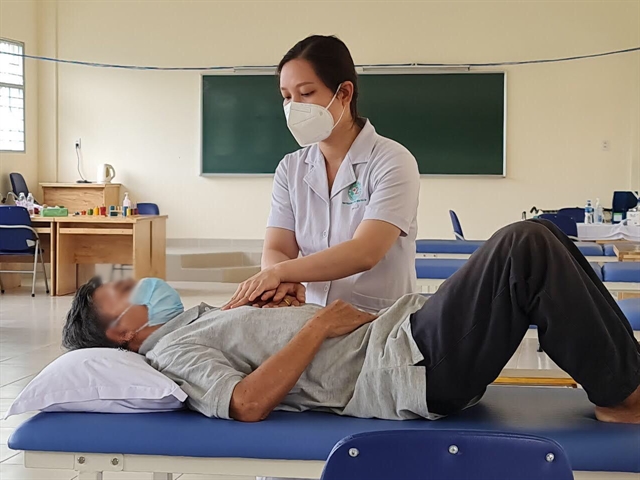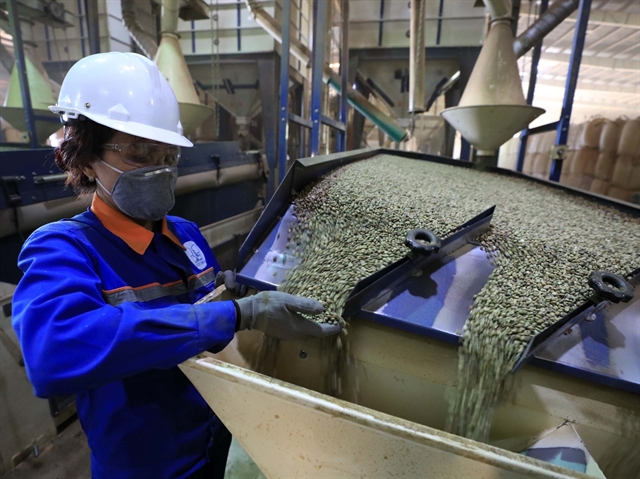 Society
Society

Q.H of HCM City recovered from COVID-19 nearly two months ago, but continues to have breathing difficulty.

|
| A patient with post COVID-19-condition gets treated at the Centre for Rehabilitation and Psychotherapy after Contracting COVID-19 at Lê Văn Thịnh Hospital in HCM City’s Thủ Đức city. — Photo Courtesy of the hospital |
Gia Lộc
HCM CITY — Q.H of HCM City recovered from COVID-19 nearly two months ago, but continues to have breathing difficulty.
“The shortness of breath sometimes becomes bad,” she said.
In a Facebook group titled ‘F0 không cô đơn’ (COVID-19 patients are not alone), many other people who have recovered also say they experience shortness of breath.
Others say they have sleep and skin problems, hair loss and headaches.
According to the World Health Organisation (WHO), while most people with COVID recover and return to normal health, “Some people can have symptoms that last weeks or even months after recovery from acute illness.”
Even people who are not hospitalised or had mild illness could experience a persistent ‘post-COVID-19 condition’ or late symptoms, and some could develop medical complications with lasting health effects, it added.
Dr Nguyễn Thanh Sang, director of the Centre for Rehabilitation and Psychotherapy after Contracting COVID-19 at Lê Văn Thịnh Hospital in HCM City’s Thủ Đức city, said: “Shortness of breath, headache, sleep problems, and hair loss are common symptoms of post-COVID-19 condition.”
Some 30-50 per cent of people who have recovered suffer from the condition, he said.
According to health experts, COVID damages the lungs and many other organs, including the heart, kidneys and the brain, leading to health complications that linger well after the illness.
Speaking at Thống Nhất Hospital’s telemedicine programme this month, Dr Ngô Thế Hoàng, head of the hospital’s respiratory diseases department, said the causes of the post-COVID-19 condition could be the cytokine storm in which the immune system is producing too many inflammatory signals, sometimes leading to organ failure and death.
Patients who were in intensive care or had a long stay in a hospital are among the high-risk groups, he said.
The disease worsens pulmonary fibrosis and easily causes post-COVID-19 condition in people with it, he said.
The post-COVID-19 condition includes long-term effects on many organs including the brain, lung, skin, and heart if left untreated, he said.
“The effect on the lungs can make people who have recovered from COVID have long-term issues such as shortness of breath, tiredness or fatigue, sleep problems, chest pain, and others.”
Sang said, “People with post-COVID-19 condition should visit hospitals to be treated as soon as possible to help reduce life-threatening risks and the effect on their quality of life.”
Many people who have recovered from COVID could also have psychiatric disorders and need psychiatric counselling, he said.
Many hospitals have set up rehabilitation centres to treat people with post-COVID-19 condition.
They examine organs for damage and treatment, and also teach patients breathing exercises.
Sang said his centre is collaborating with psychologists from the HCM City University of Education to provide counselling to people with post COVID-19 condition to prevent anxiety.
“After one week of treatment, most symptoms of post-COVID-19 condition go away.”
At the HCM City University Medical Centre, doctors examine the lung, liver and heart for inflammation and blood clots and check the mental health to prescribe treatment.
Thống Nhất Hospital has set up a ward for rehabilitation of people having post COVID-19 condition.
It also treats frontline personnel suffering from stress.
Dr Trương Hữu Khanh, former head of HCM City’s Children's Hospital No 1’s infectious and nervous diseases department, said: “People who have recovered from COVID-19 should eat nutritious food and vitamin supplements to help improve their health. They should not be too worried about the condition. They should not trust advertisements about COVID-19 detox regimes.”
Other health experts said people who have recovered from COVID-19 should avoid strenuous work, and exercise regularly. — VNS

.jpg)


